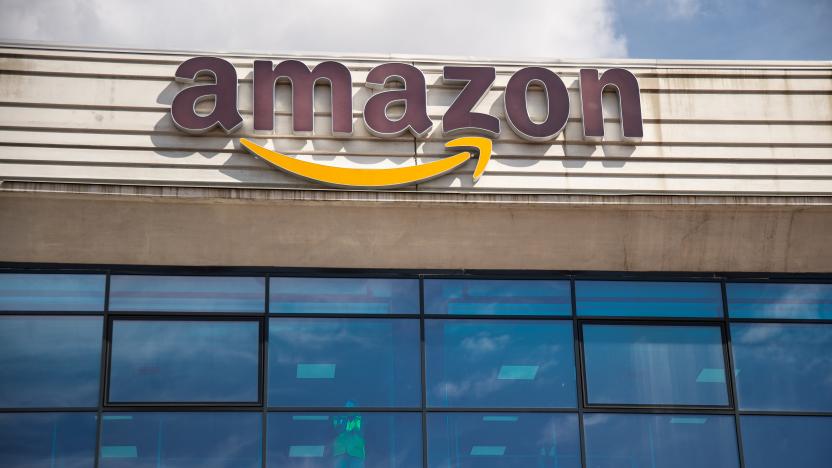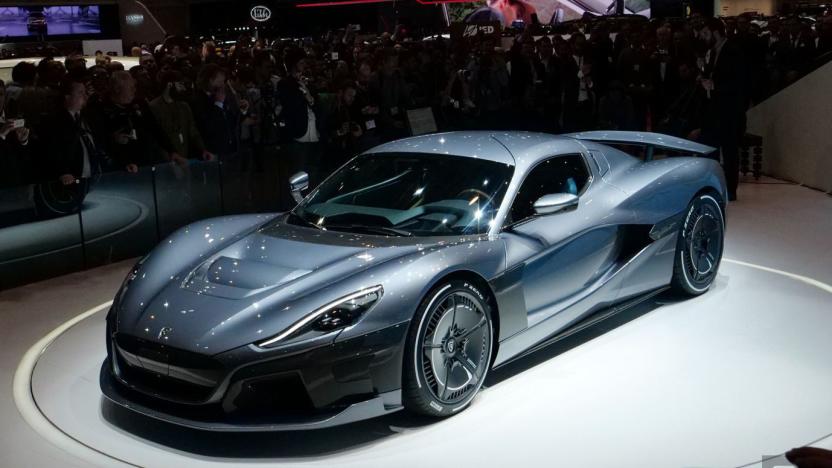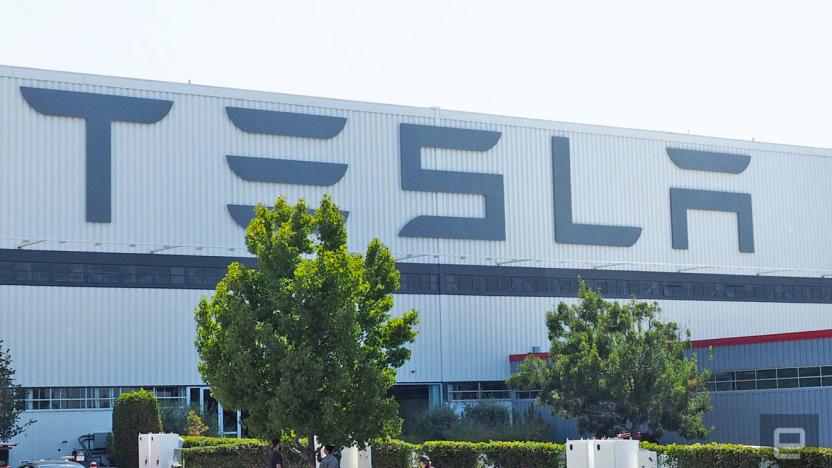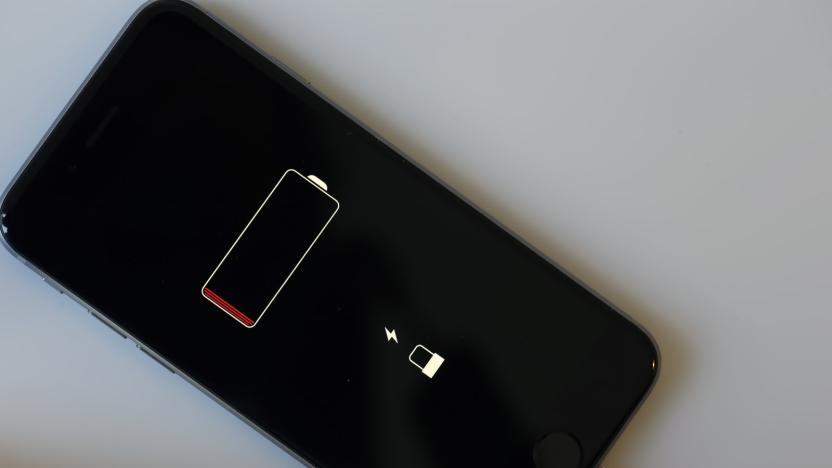supplier
Latest

Amazon reportedly pressuring suppliers for a discounted stake in their businesses
It has struck deals to potentially buy stock in dozens of vendors at below-market rates.

Porsche now owns almost a quarter of EV car maker Rimac
Porsche has invested an additional €70 million ($83.3 million) in Rimac, boosting its stake in the hypercar manufacturer and EV component supplier from 15 to 24 percent.

Tesla asking suppliers for money back is a risky move
The Model 3 will do one of two things for Tesla: It'll make the company a profitable seller of cars, solar panels, and batteries; or, it'll drag it further into debt. To keep the latter from happening, the company is doing something that seems insane: It's asking some of its suppliers for money back for parts it already bought. Parts going back as far as 2016.

Apple may secure its own battery materials to avoid shortages
Cobalt is an essential component in lithium ion batteries, making it a crucial material in the production of smart devices and electric vehicles. But, as battery-hungry cars go mainstream, there's a risk that the world's supply will be eaten up by cars, which poses a problem for all of the other things we use. It's why Apple has reportedly entered into direct talks with cobalt miners in the hope of securing a supply of the material itself. Bloomberg reports that the company, which has previously left the effort to its battery manufacturers, has now taken a more active role.

Apple still faces challenges in the fight for better working conditions
The factories where our gadgets are built can be nasty, inhumane and sometimes lethal places to work. As the richest company on the planet, Apple has a duty to lead the charge against poor conditions and child labor. Today, the company has published its ninth annual Supplier Responsibility report that repeats its commitment to treat all workers with "dignity and respect." The headline stats are positive, and the company only found 16 child labor violations, but there's still a few things that have to be worked on.

Apple supplier tagged with another round of labor violations
Apple's gearing up for a very big day next week, but it to the people inside it must seem like this one will never end. First the company was implicated in perhaps the biggest celebrity leak of all time, and now it's getting wrapped up in another round of alleged labor violations thanks to one of its China-based suppliers. A report released by China Labor Watch and the environmental watchdogs at Green America maintains that some workers at a Catcher Technology factory in Suqian that produces aluminum cases for Apple products were found putting in crazy overtime hours (up to 100 hours a month in some cases) and used toxic chemicals without being safety trained.

Independent medical team finds no link between employee death and Apple supplier Pegatron's working conditions
After a 15-year-old worker died of pneumonia at Pegatron, a Chinese supplier, Apple had an independent team of medical experts sent to the facility to verify working conditions, Bloomberg reports. The worker had previously been cleared as healthy just a month prior to his death. An official Apple statement on the matter reads, "While they have found no evidence of any link to working conditions there, we realize that is of little comfort to the families who have lost their loved ones. We have a team working with Pegatron at their facility to ensure that conditions meet our high standards." This isn't exactly the first time that Apple -- or any large electronics manufacturer, for that matter -- has faced concerns over manufacturing practices. Foxconn, one of Apple's largest suppliers, has had an ongoing battle with employee suicides and allegations of unsatisfactory working conditions.

Browse through this interactive map of Apple's suppliers worldwide
Apple releases a list of all of its hardware supplier partners about once a year, as part of its Supplier Responsibility program. But the most recent list of suppliers included not only company names, but also addresses for each, and so a site called ChinaFile took all of those addresses and put them into an interactive Google map. With a few clicks and drags, you can now visually browse and see just where Apple is getting all of its various iPhone, iPad, iPod and Mac parts from. As you can see above, the distribution is one of the most interesting views. Obviously, the majority of Apple's suppliers are still based over in Asia, and when you zoom in, you can see that big number is split between Japan, China, Hong Kong and South Korea. But Apple also gets parts from the US and Europe, and even places as far away as Brazil. Unfortunately, what this map doesn't show you is exactly what products and parts come from which suppliers. In a few places, you can guess, and in some places the information isn't very relevant (the address in Australia, for example, is just an address Down Under for a supplier that primarily works out of Asia). But nevertheless, this is an interesting look at just how global Apple's hardware business is.

Apple drops supplier over underage labor violations, hails 'high compliance' with reducing excessive work hours
Apple's latest Supplier Responsibility Report has just been published, detailing 393 audits focused on the plants and suppliers that help make all that hardware. The audit number is a 72 percent increase in what it covered in its last annual report, while Apple was also quick to highlight its contracting companies' high compliance (92 percent) with a maximum 60-hour work week. Senior vice president of operations Jeff Williams told Reuters that underage workers and limiting working hours were two of the most challenging issues it faced in its supplier audits. Apple decided to end business relations with component maker Guangdong Real Faith Pingzhou Electronics over underage labour issues. "We go deep in the supply chain to find it," said Williams. "And when we do find it, we ensure that the underage workers are taken care of, the suppliers are dealt with." Update: As 9 to 5 Mac noticed, the supplier report also contains another notable detail: it lists Freemont, California-based Quanta Computer as one of Apple's final assembly facilities.

Made For iPhone manufacturers may have to comply with Apple's supplier responsibility code
There's no gaggle of satellite trucks or eager liveblogs documenting every moment, but one of the most important Apple-related events is going on right now in Shenzhen, China: the annual MFi (Made For iPhone/iPad/iPod) manufacturers' conference. This multi-day meeting is the interface, so to speak, between Apple's mobile products and the vast ecosystem of accessories, gadgets and peripherals that swarms around them. Only MFi-licensed vendors can use the "Made for iPhone" logo on their packaging, and they are the only ones who get access to Apple's internal documentation for interfaces and connectivity. With the advent of the Lightning connector across the iOS product line, this year's conference is a key opportunity for vendors to get the intelligence they need for 2013 and beyond. In fact, reports last month revealed that Apple intends to control the supply of Lightning connector pins directly, rather than allowing third parties to make the parts themselves. The cone of silence surrounding the MFi meeting is intense, unlike the rather leaky WWDC experience. That's understandable: there's way fewer MFi companies than iOS/OS X developers, and the technical information under discussion at the MFi conference could provide Apple competitors with valuable intel. Nevertheless, during the meeting this week a few interesting tidbits have made their way to us through the Great Firewall. Most are trivial (did not know: the Lightning connector is waterproof!) but one big one is not. According to our source at the event, Apple intends to make compliance with its supplier code of conduct a condition of MFi licensing. The supplier code, which has been implemented and expanded over the past few years as Apple and manufacturing partner Foxconn have come under increasing scrutiny for working conditions, currently applies only to Apple's manufacturing supply chain partners and component vendors. Pushing it out to the larger accessory ecosystem would be a concrete example of Apple using its 800-pound-gorilla status in the consumer electronics space to influence more companies to behave ethically on worker rights, environmental issues and more. Of course, there may well be MFi participants who see this move as heavy-handed and unnecessary. It's not yet clear what the schedule, audit requirements or penalties for non-compliance might be -- but there may be some vendors at the margins who feel that the additional effort and expense to comply decreases the overall value of participating in the iOS accessory market. Even if you don't believe the DigiTimes rumor that Foxconn is considering building out LCD TV manufacturing plants in the US (and we don't), accessory makers which have US-based operations may have a leg up on compliance over those in China and elsewhere. We'll keep an eye out for official word of these policy changes in MFi over the next few weeks.

Microsoft reportedly building up to 5 million Surface tablets for the fall
Just how confident is Microsoft that its Surface tablets will take off? To the tune of 3 to 5 million units shipped in the fall alone, according to the Wall Street Journal's supplier contacts. While that wouldn't be much when Apple already ships more than three times as many iPads, even discounting the supposed 10 million tiny iPads coming this fall, it would represent a strong start for a company that's only just dipping its toes into own-brand computing. Microsoft isn't confirming any numbers at this stage, but the large production volume might explain that Busby Berkeley-style TV ad -- you'd want a full song and dance routine if you had that many Surfaces to sell.

Samsung finishes initial Chinese factory audits, plans long-term solutions to labor woes
Samsung faced some serious allegations surrounding the plants of its Chinese contractor HEG Electronics earlier this month, including potentially dire accusations that HEG was employing child labor. The Korean firm promised audits to set the record straight, and we're seeing the first fruits of those inspections today. The results were decidedly mixed. While there weren't any underage workers when Samsung visited, it did find HEG staff working excessive overtime, some unsafe practices and a system that punished late workers with fines. Samsung's response will go beyond just asking HEG to shape up, though: it plans to finish auditing all 105 of its exclusive Chinese contractors by the end of September, determine whether inspections of non-exclusive contractors are needed and set up a long-term audit schedule past 2013 that includes tougher requirements. While there's no certainty that the reforms will lead to the intended results, we're glad to hear that Samsung wants to turn things around at such a rapid pace.

Apple supplier shows 95% overtime compliance in March 2012
Apple maintains a supplier responsibly report on its website and recently added some new statistics that show overtime working conditions are improving in its factories. Noticed by The Next Web, Apple is now seeing 95 percent compliance with its 60-hour work week requirement. This is up from 89 percent in February 2012 and 84 percent in January 2012. As noted before, most workers are averaging a 48-hour work week. This latest report covers over 800,000 workers in supply chain factories who are tracked weekly. [Via The Next Web]

Apple name-drops Corning as iPhone glass manufacturer, we feign surprise
For a company so focused on secrecy, Apple never really did all that good of a job keeping its connection with Corning under wraps. We've always suspected that the company enlisted the Gorilla Glass maker for the iPhone, though it didn't really go out of its way to admit it -- even going so far as omitting the New York-based company from its 2011 suppliers list. Cupertino offered it a little love today, however, giving Corning a nod in its chipper job creation report. While it didn't actually mention Gorilla Glass by name on the page, Apple was happy to talk up the "Corning employees in Kentucky and New York who create the majority of the glass for iPhone."

ST-Ericsson's NovaThor to power Nokia's Windows Phone devices, loosens Qualcomm's grip
Earlier this year, as you may recall, we learned that at least some of Nokia's Windows Phone devices would be powered by a dual-core chip from ST-Ericsson. At the time, this report came as something of a surprise, considering the fact that Qualcomm had long enjoyed hegemony over the Windows Phone market. Today, however, it becomes official, as Nokia has now selected ST-Ericsson's NovaThor platform as its Windows Phone supplier. There is no sign, however, that this deal will be exclusive, so it's likely that the manufacturer will continue to use Qualcomm silicon in addition to ST-Ericsson's ARM-based line of U9500, U8500, and U5500 dual-core CPUs. We also have yet to hear any confirmation on the specific devices that these chips will power, or when they'll go into production, though we'll be sure to let you know as soon as we get word. Skip past the break for a really short press release.

Tablet component suppliers concerned over iPad's dominance
Tablet component suppliers in Asia are concerned about the lack of competition in the tablet market. The iPad is the dominant player and is driving the growth in the industry. This is great now that the iPad is growing 166% year over year, but it doesn't bode well for the future when iPad sales reach their saturation point. Other tablet manufacturers are either dropping out of the race completely or proceeding cautiously. As a result, these companies are ordering small volume orders which won't help component suppliers when the demand for the iPad sales begin to level off. To combat this possible slowdown, component suppliers are reportedly working hard to meet the demands of these trailing tablet makers. Second tier component suppliers, in particular, are more flexible and willing to accept these smaller orders. These suppliers are likely grabbing orders while they can and hope that one of these competing tablets will catch on before iPad demand begins to plateau.

Apple moving away from Samsung memory components
Apple has allegedly already switched away from Samsung for production of the next-gen A6 processor for iOS devices, and if the latest report from Digitimes is accurate, Apple's also diversifying its sources for DRAM and NAND memory. Digitimes' sources claim that Apple is now starting to source NAND memory from Toshiba and mobile RAM from Elpida. Currently, a fairly large proportion of the internal components of iPhones and iPads are actually manufactured by Samsung. Considering the much-publicized global patent spats between the two companies, this puts Apple in a potentially awkward position. It makes good business sense for Apple to start sourcing components from the few tech companies on Earth that haven't filed lawsuits against it (yet). MacRumors points out that Samsung's currently contracted for US$7.8 billion in parts over 2011, including the A5 processor that powers the iPad 2. Although Samsung is the world's largest supplier of many electronic components, losing Apple's business will likely put a very large dent in the Korean tech giant's ledger.

Report: Touchscreen demand to grow by 90-percent, led by mobile, tablet markets
This just in: people really like touchscreens, and their tastes aren't going to change anytime soon. That's the takeaway from a new report from market research firm DisplaySearch, which predicts that revenue from touch panel sales will hit the $13.4 billion mark by the end of this year, before soaring to nearly $24 billion by 2017. Shipments of capacitive touch displays, in particular, are expected to increase by 100-percent over last year, accounting for a full 70-percent of all tactile revenues. The mobile market still accounts for most of this industry-wide growth, but demand for touch-based tablets is accelerating considerably, with more than 72 million panels expected to ship this year, and 100 million projected in 2012. Jonesing for more numbers? Better gallop past the break to get your hands on the full PR.

Wintek workers still experience effects from n-hexane exposure, Apple issues a report
It's been a few months since we checked in on the workers at Wintek, where they manufacture touchscreens for the likes of Apple. As you might remember, the former company was facing a lawsuit for chemical poisoning that occurred between May 2008 to August 2009 when the company substituted alcohol for n-hexane in the manufacturing process. Both Apple and Wintek maintain that ultimately a total of 137 people had been hospitalized, and all have recovered -- but as Reuters points out, daily exposure to the chemical has been known to cause "long-term and possibly irreversible nerve damage," and Wintek employees have maintained that the company has left them holding the bag for symptoms that could very well flare up again in the future (or, in some cases, never really went away). "We are unable to cope with the medical costs of treatment in the future," said Guo Ruiqiang, a worker at the plant. "We can only stay in the factory and see what happens. We just feel very helpless now." For Apple's part, the company has mandated that Wintek "work with a consultant to improve their Environmental Health and Safety processes and management systems" in anticipation of a complete reaudit of the facility in 2011. [Warning: PDF More Coverage link]

HP's first webOS tablet may start shipping in March, fulfill longstanding promise
Way back in August of last year, when temperatures were above zero and Honeycomb was still a great unknown, HP promised us the first webOS tablet will come "in early 2011." Just yesterday, however, our noteworthy exposure of the vanguard members of the webOS tablet family led us to believe that at least one of them, the Opal, would take until September to arrive. That may still be the case, but DigiTimes is bringing us back around to HP's original pledge, with word that Inventec has received instructions from HP to start producing and shipping a webOS slate (most probably the Topaz) in March. As usual, this comes from the (in)famous insider sources that tend to miss as often as they hit, but it does make sense for HP to follow up its February event with a relatively rapid product rollout.












